Cyprus has one of the most beautiful coastlines in Europe, a low cost of living, and wonderful tax benefits for expats.
I’ve been there dozens of times and it’s one of my two favorite places in Europe.
But…
Let me ask you something:
- Can you handle having no water coming out of your tap for days during summer?
- What about dealing with bureaucracy so slow it makes watching paint dry seem exciting?
I’ve seen expats lose their savings to fix problems they never saw coming… but I don’t want that for you.
So today I’m revealing the five very specific challenges that catch most expats completely off guard. I’m talking about issues so serious that many pack up and leave within their first year.
But those who know how to navigate these challenges? They absolutely love living in Cyprus.
I’ll show you exactly what catches most expats off guard, why these challenges are more serious than you might think, and most importantly: how to handle each one like a pro.
What I will tell you today can save you from making a very expensive mistake.
1. Water Taps Might Run Dry During Summer
You wake up on a hot July morning, turn on your tap, and nothing comes out. Not even a drop.
You twist the handle again, thinking maybe you didn’t turn it enough. Still nothing.
Welcome to your first Cyprus summer water shortage and, trust me, it won’t be your last. This is not a rare emergency in Cyprus; it’s a regular summer reality that catches most expats completely off guard.
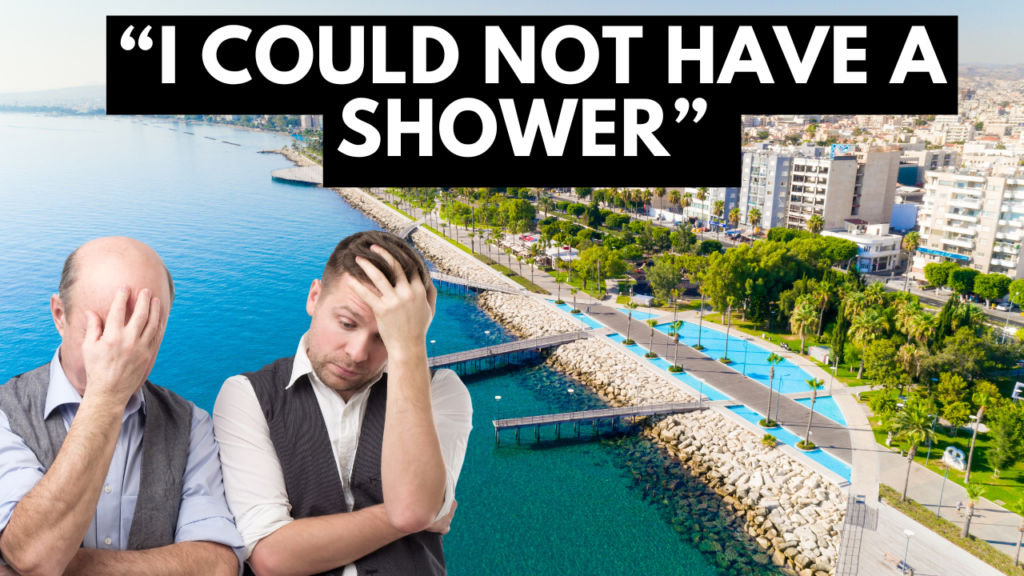
While you are panicking about your morning shower, your Cypriot neighbors are calmly reaching for their backup water containers because they’ve been through this routine dozens of times before.
This is what a local shared with us about the water shortages in Cyprus:
“We could at least mitigate the situation with reforestation, water management, conservation etc., but we won’t because we are stupid. We would rather build golf courses.”
The numbers tell the frightening story here. Dam capacity in May 2025 stood at just 24.6%, down from 47.2% the previous year.
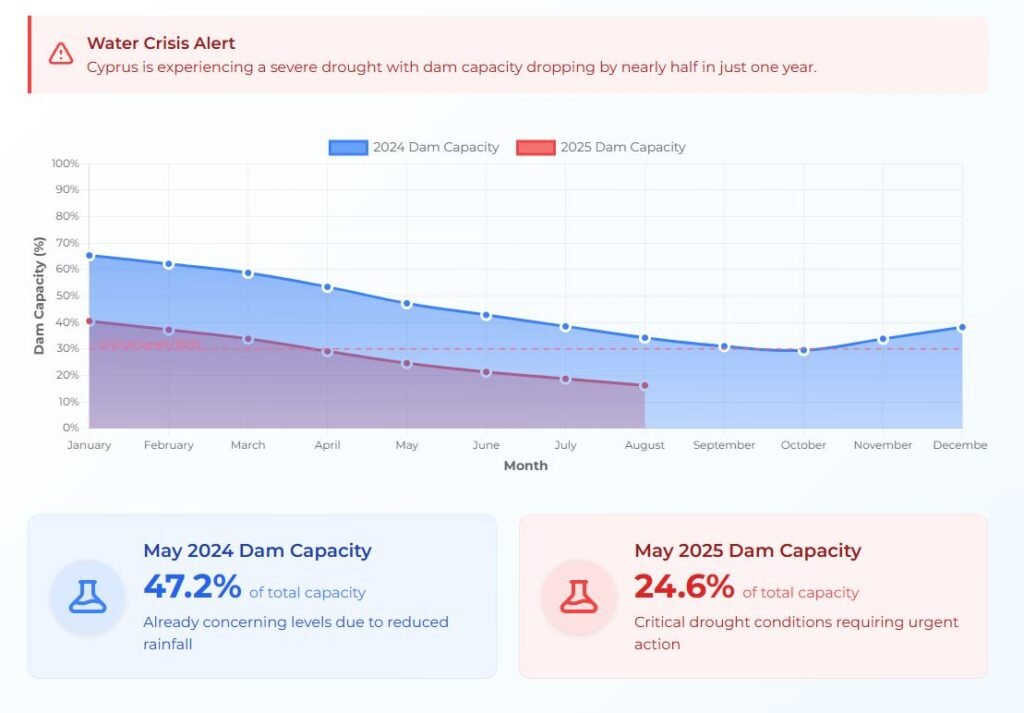
Cyprus has a water exploitation index plus value of 71%, indicating severe scarcity, and it’s the worst in Europe in this indicator.
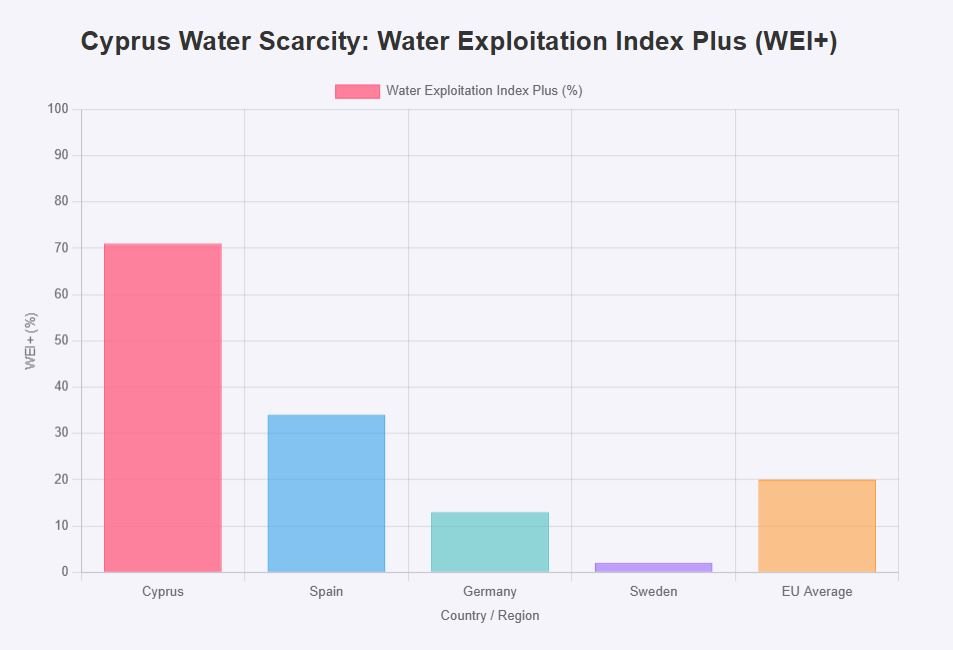
The island has endured a 4-year drought that has pushed water infrastructure to its breaking point, with the water department warning that 2026 could become a crisis year if conditions don’t improve.
The government is scrambling to build more desalination plants, but these cost a fortune, and the bills get passed down to residents. Five permanent plants currently produce 235,000 cubic meters of fresh water daily, with four additional mobile units coming online soon.
That sounds impressive until you realize Cyprus has some of the biggest household water consumption in Europe at 105 cubic meters annually. And population growth puts more pressure on limited resources.
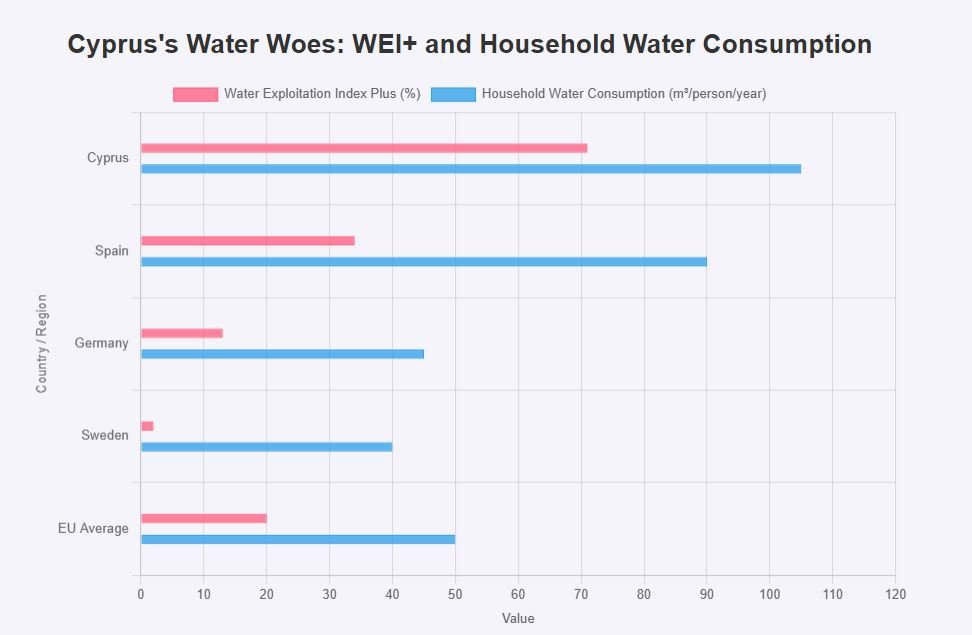
Smart Expats who survive this challenge install tanks, learn the local schedule, and expect bills of 50 to 60 euros in private homes with gardens during warm seasons. Average apartment water bills run from 20 to €40 monthly, but private residents easily hit higher costs.
Some areas, like Paphos, get hit worse than others, and the timing is always during peak summer when you need water most for cooling and basic comfort.

Here is what separates the expats who stay from those who pack up and leave: preparation and realistic expectations about water availability.
The ones who pick up after their first summer are usually those who expected northern European level water availability without understanding that Cyprus is a Mediterranean country. Those who adapt learn to live with backup water systems and conservation habits that would seem extreme in most Western countries.
FREE FOR A LIMITED TIME: Grab your Expat Wealth & Lifestyle Compass ($108 value) today! Includes our 74-page guide of Affordable European Cities, our Zero-Tax countries report, and our expat checklist. https://bit.ly/ExpatWealthLifestyleCompass Join us here before this offer ends.
2. The Non-Stop Summer Heat
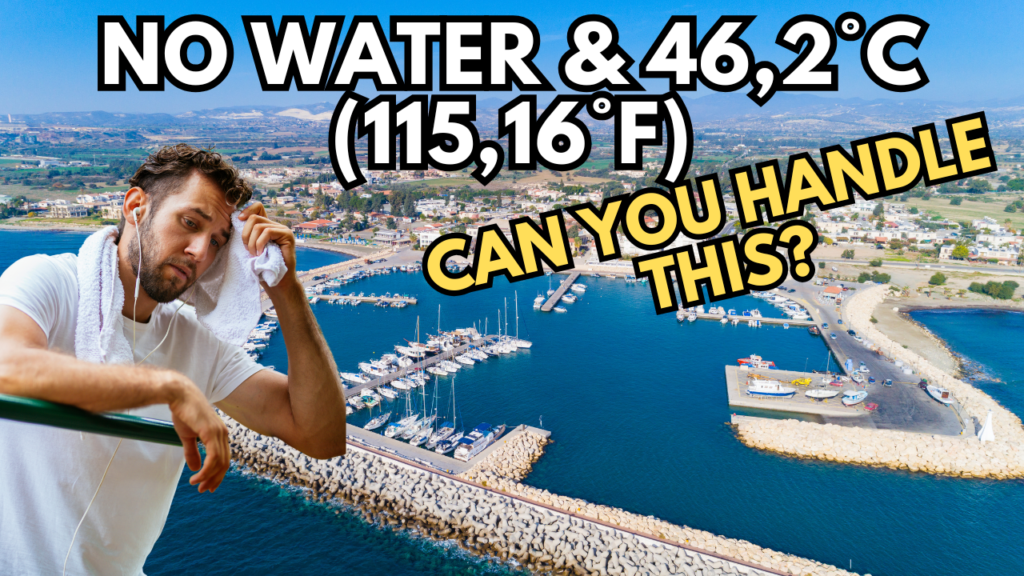
But water shortages are just the beginning of what makes Cyprus summers challenging for unprepared expats.
The summer heat is nonstop. Cyprus summers are more of a reminder of the Middle East than southern Europe, and this catches most expats completely off guard.
The temperature alone tells only half the story; Cyprus summers deliver desert-level heat that transforms daily life in ways you never imagine. We are talking about 36°C temperatures in Nicosia during July and August, but the humidity makes it feel like a sauna at 40 degrees or higher.
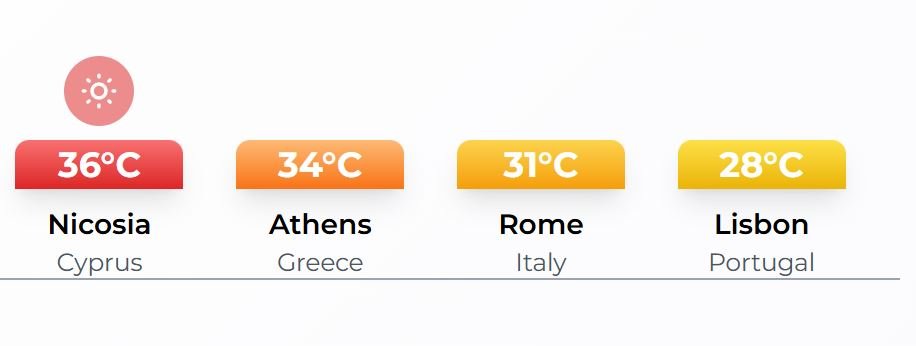
That crushing Mediterranean thermal sensation turns every breath into work, and your body struggles to cool itself through normal sweating. Nicosia hit a record of 46.2 Celsius in September 2020, proving that extreme temperatures are not just occasional spikes.
Most expats arrive thinking they love warm weather, but Cyprus’ summer heat is a different beast entirely. It’s relentless from June through September with no relief in sight.
You wake up at 6:00 a.m. and it’s already 28 Celsius. By noon, stepping outside feels like opening an oven door and the heat doesn’t break until well past sunset.
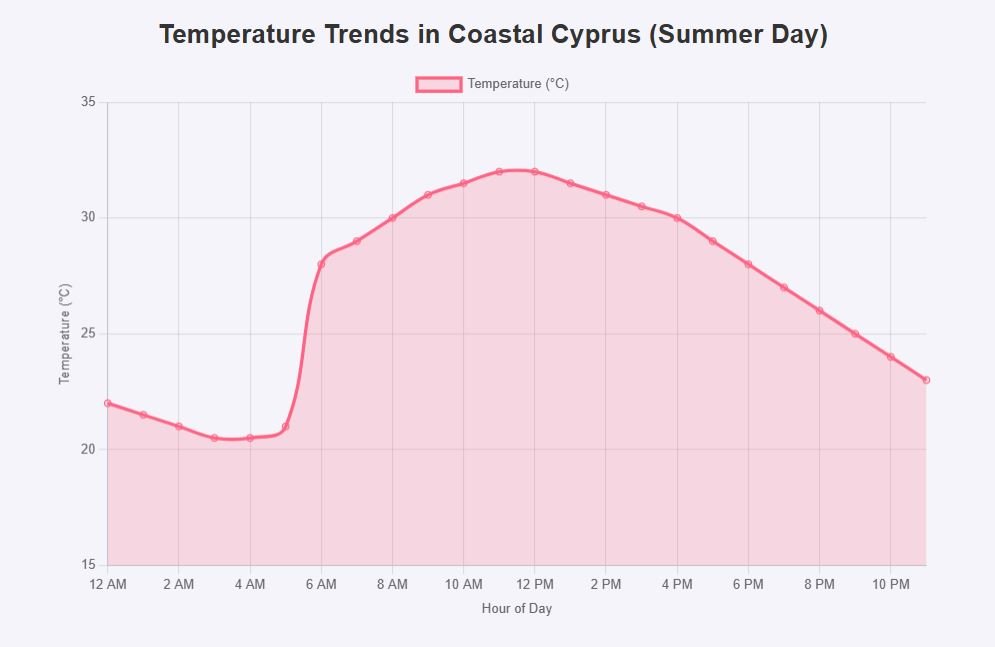
The Troodos foothills offer some respite at around 27 Celsius during summer months, but that means leaving coastal areas entirely. During summer even the nights are warm. Coastal areas like Limassol and Pathos still hover around 22°C at midnight.
You will need air conditioning and here comes the other part of the problem: your electricity bills will shock you more than the heat itself. Expect summer AC use of 200 to €300 a month versus 100 to €150 in milder seasons.
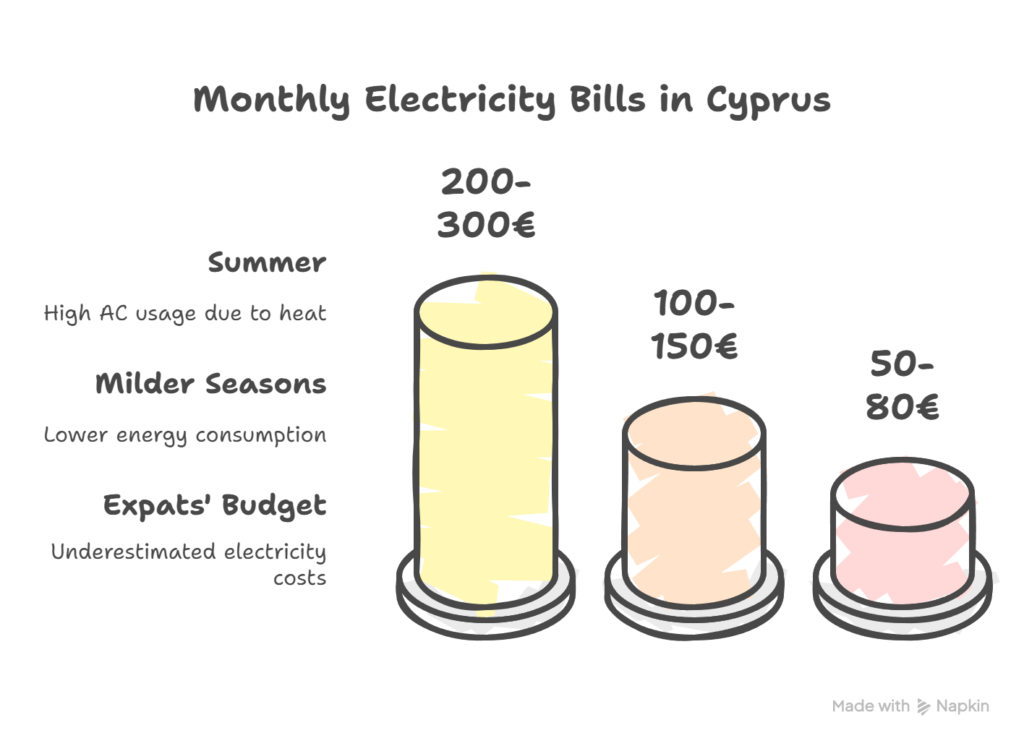
And Cyprus has some of Europe’s highest energy prices.
Studies show significant health risk spikes during heat waves, especially for older residents. We are talking about real health dangers, not just discomfort.

The heat changes everything about your daily routine. Simple tasks like walking to a nearby grocery shop become strategic missions requiring water bottles and shade planning. The ones who thrive in Cyprus adapt with such small but smart tricks.
Some British expats described to us July and August as unbearable, with many returning to the UK for five to six weeks during peak summer.
But surviving the heat is just one challenge…

3. Bureaucracy That Makes a Sloth Look Fast
Once you’re ready to handle official business, you discover that Cyprus operates on an entirely different timeline than what most expats expect. And the next obstacle alone causes more people to give up than the two previous combined.
Other than the Italians, the Greeks are the masters of bureaucracy, and Cyprus inherited this part of Greek culture, which I covered in another article here about retirement in Greece.
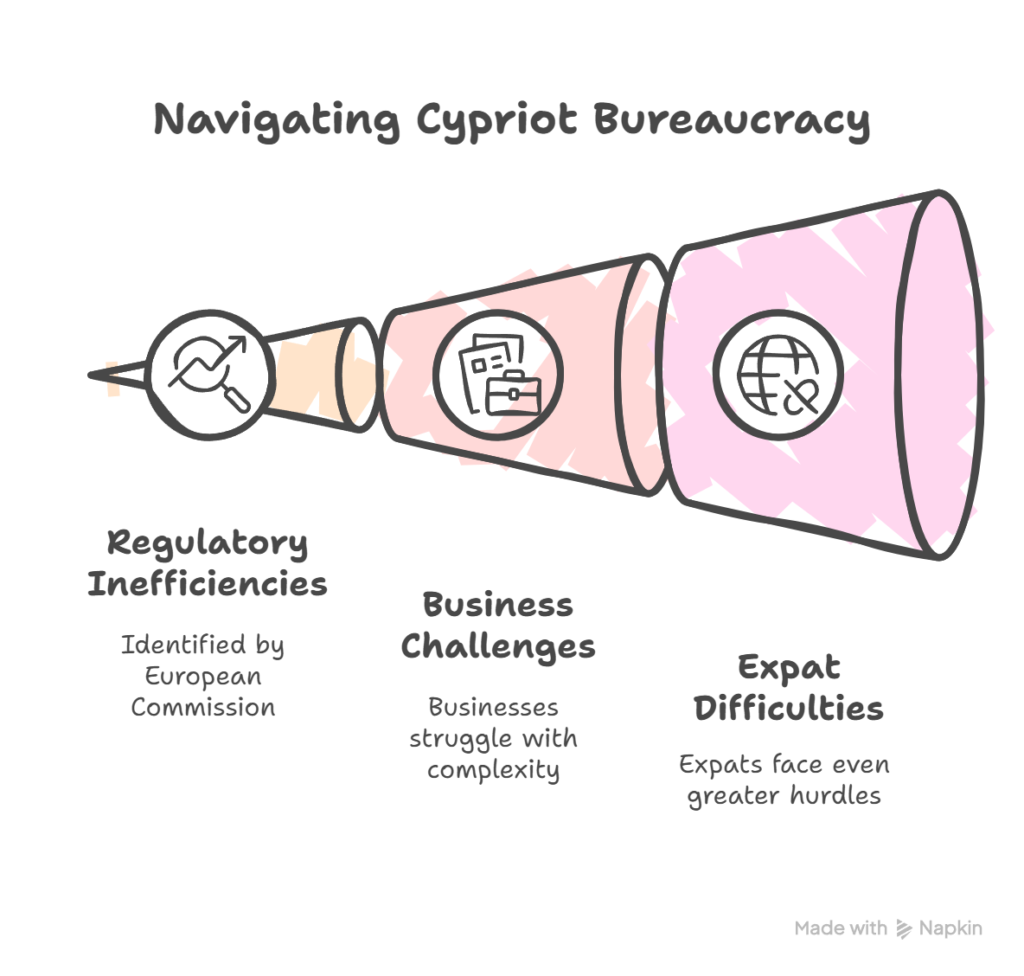
The government offices operate on what locals call “siga siga” – slowly, slowly – and this perfectly captures how official processes unfold.
The European Commission noted regulatory and administrative inefficiencies in 2025, with a majority of Cypriot businesses reporting that complex procedures hinder their operations. If businesses struggle with the system, imagine what individual expats face.
On the other hand, some Cypriots apparently are not bothered by the bureaucracy and learned to coexist with it. This is what a local told us:
“There is this very slow bureaucracy. Some find it very annoying, but it doesn’t bother me much. What if it took me 1.5 years to get rid of a broken car? I got rid of it eventually, and it’s not like it’s bothering me now anyway in the meantime.”
What takes a week in Germany or Sweden can easily stretch into months in Cyprus, and there is no amount of urgency or frustration that will speed things up. Getting a simple residence permit can take months of back-and-forth visits to offices that close at random times and require documents you never heard of.
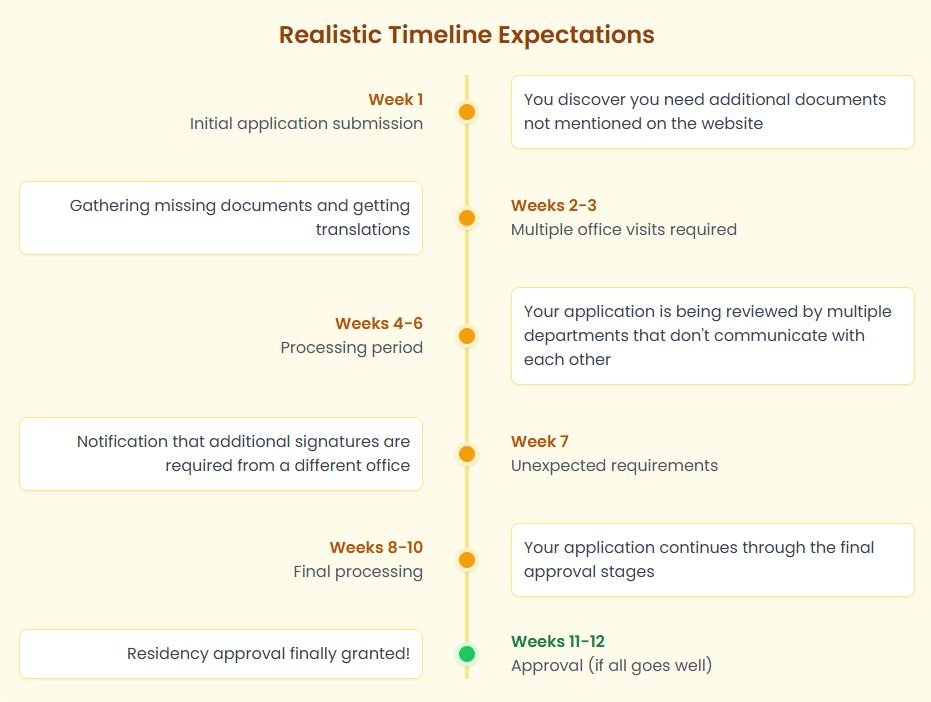
You start with a long-stay category D visa then apply for a category F retirement permit, which takes two to three months, assuming everything goes smoothly. Post-Brexit British expats face even more red tape, with some reporting bureaucracy nightmares that cost thousands in legal fees and months of stress.
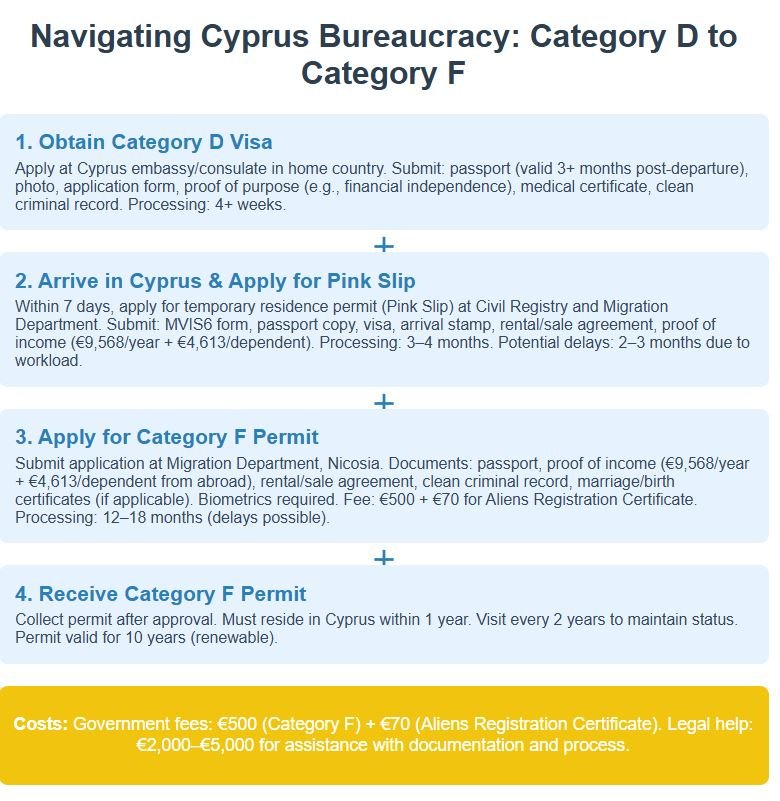
British expats significantly struggle with the MEUKW1 permit and social insurance registration, where each is often required before the other can be obtained.
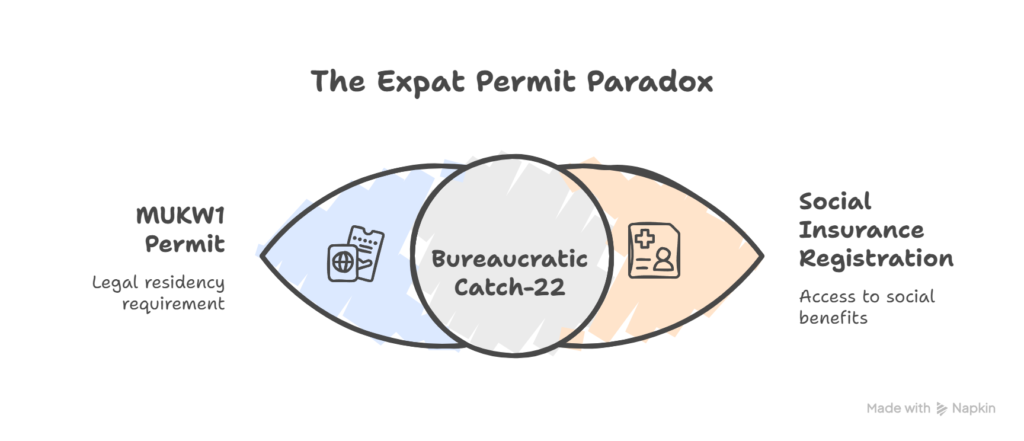
Everything requires stamps, signatures, translations, and approvals from multiple offices that don’t talk to each other.
The language barrier makes it worse since most official documents are in Greek, and Google Translate won’t help you navigate complex legal requirements. While English is useful when shopping for groceries or small tasks, to deal with paperwork, a bilingual advisor greatly cuts down confusion in government offices.
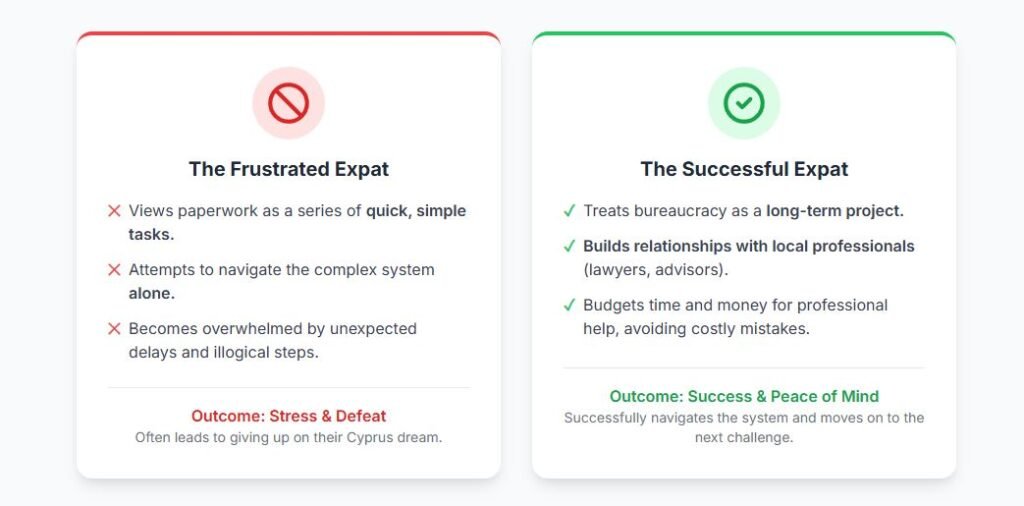
What breaks most expats is not the cost; it’s the psychological toll of dealing with inefficient systems where nothing happens quickly. Those who succeed treat bureaucracy as a long-term project, not a quick task, and they build relationships with local professionals who know how to navigate the system.
But even after you’ve conquered the paperwork maze, you discover that getting around Cyprus presents its own set of challenges that most expats never see coming.
4. Trapped Without Wheels in a Car-Dependent Island
Cyprus is one of the two European countries, other than microstates, that have no railway. Zero. And rural buses just run two to three times a day, so a car is almost mandatory for basic survival.
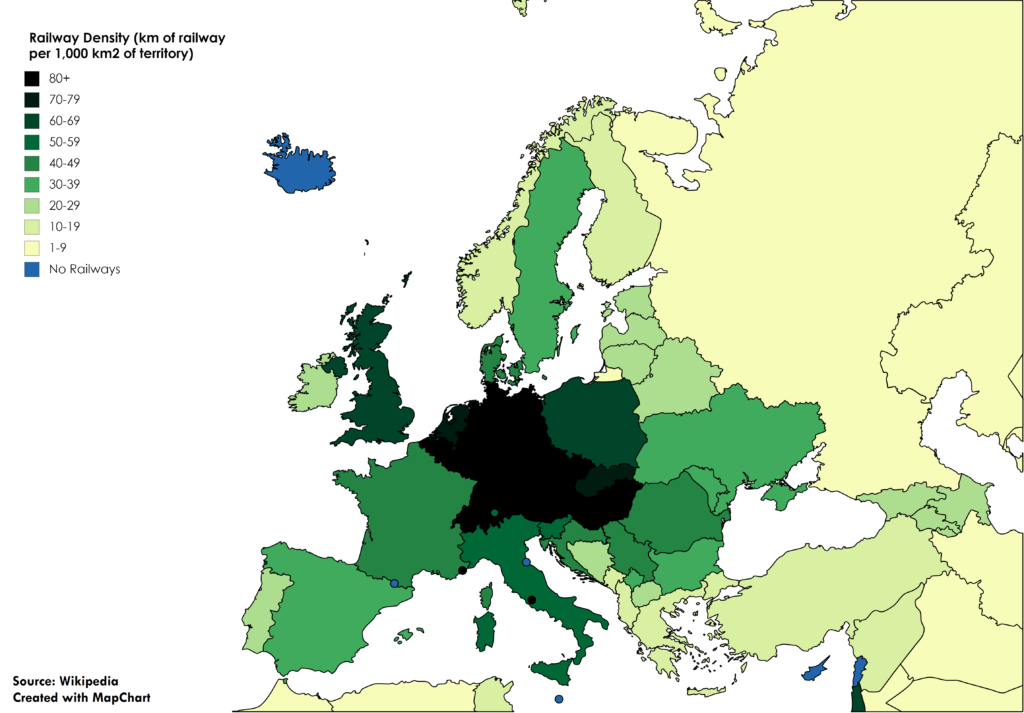
Cyprus ranks among the world’s highest for car ownership at 785 per 10,000 residents, and there is a good reason for that. Outside the main tourist areas, buses run maybe once an hour if you’re lucky, and in rural areas where housing is cheaper, public transport barely exists.
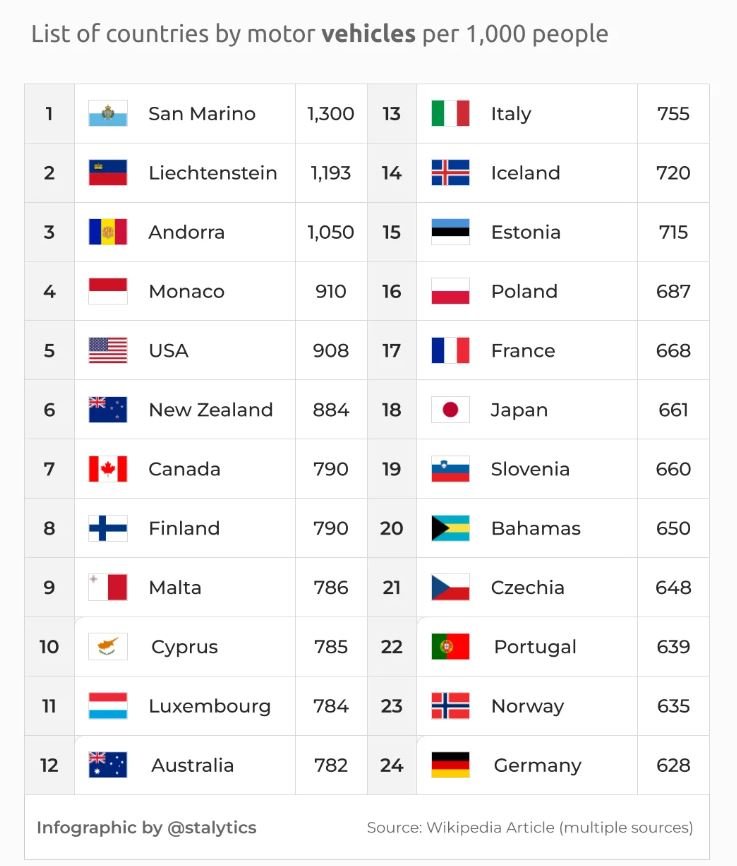
I must be fair, however: not every place in Cyprus has bad public transportation. My last article about Cyprus covered the best places to live there; the cities I suggested have good bus systems.
Taxis in Cyprus are expensive, and Uber is not available. If you don’t have a car, public transport is the only cheap way, but in the small towns, buses are rare.
Then there is the issue of the Cypriot driving culture, which locals call “assertive.” This means it’s aggressive and unpredictable; it might be difficult for those used to calm traffic.
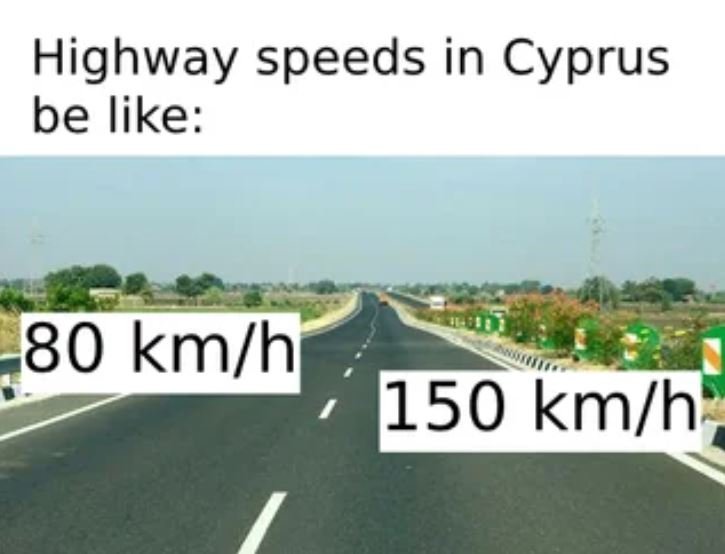
This is what a local told us about the local driving culture:
“We all drive on our own tempo, most of the time either too fast or too slow. There is barely any middle ground. We like to block a whole lane so that we can take a turn onto the main street. People park wherever without taking the rest of the cars or any safety concerns whatsoever into consideration. Everything seems so inefficient.”
Due to a combination of hot weather and a lack of public transport in some areas, car ownership becomes a must for basic needs. So you need a car for grocery shopping, doctor visits, and social events.
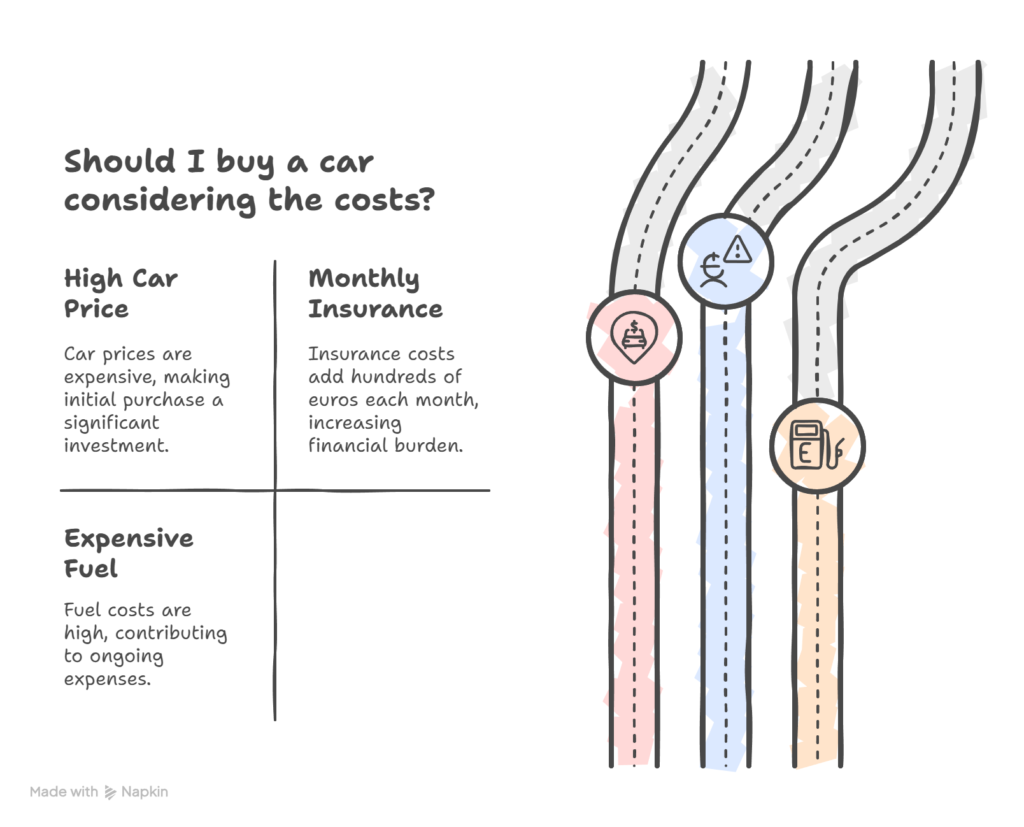
Then comes the costs. To bring a car from your home country is very expensive, and local cars are not cheap either. After buying your car, insurance can add hundreds of euros each month, but at least gasoline is around €1.3 to 1.4 euros. After Bulgaria, it’s the lowest average price in the European Union.
In big cities like Limassol, Larnaca, or Nicosia, you can live without a car, and the Pame app helps plan bus routes. Some residents also use e-scooters or small 125 cc motorcycles for short trips. But after so many accidents and violations, there is a push to prohibit those electric scooters in some cities like Pathos.
And even if you learn how to get around in Cyprus, one more challenge can impact your pocket.

5. Property Laws That Can Sink Your Savings
Cyprus property law is a minefield where one wrong step can cost you thousands of euros and years of legal battles. It’s one of the most bureaucratic countries in Europe regarding land purchase. The system creates two completely different sets of rules depending on your passport, and many expats discover this reality far too late to protect themselves.
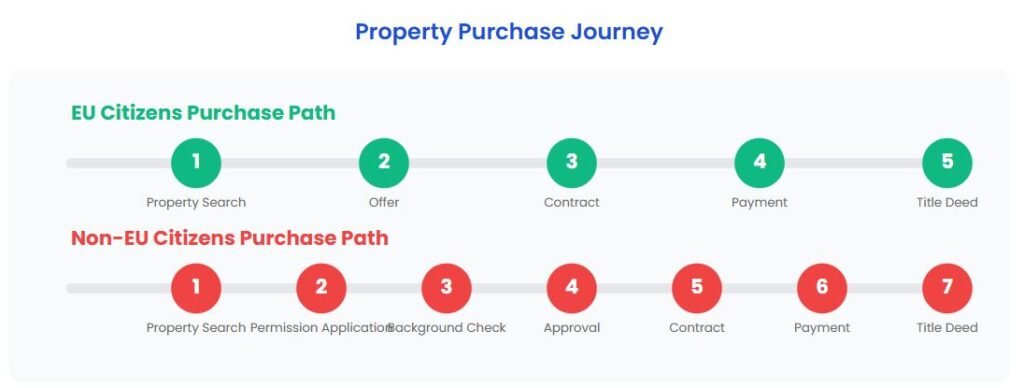
The rules are completely different for EU citizens versus non-EU citizens, and post-Brexit, many British expats discovered they were suddenly in the wrong category. What seemed like a straightforward property purchase became a complex legal maze overnight.
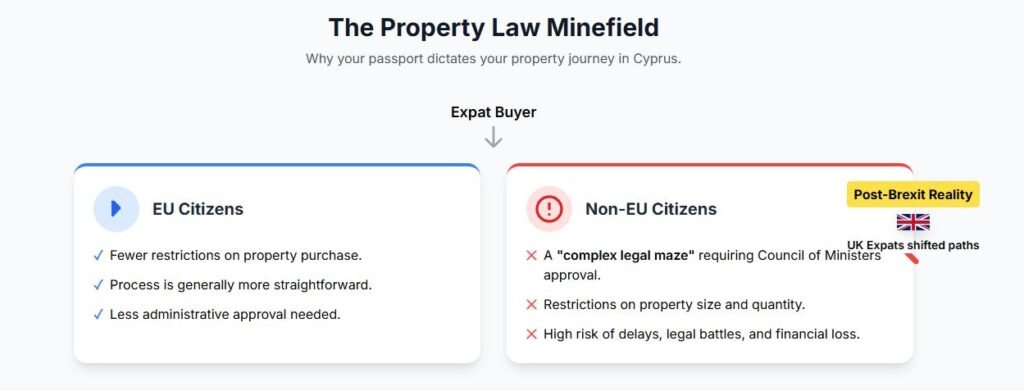
Non-EU buyers need the Council of Ministers’ approval, which takes one to three months. You are typically permitted to purchase one property not exceeding 4,014 square meters for use as a private residence only.
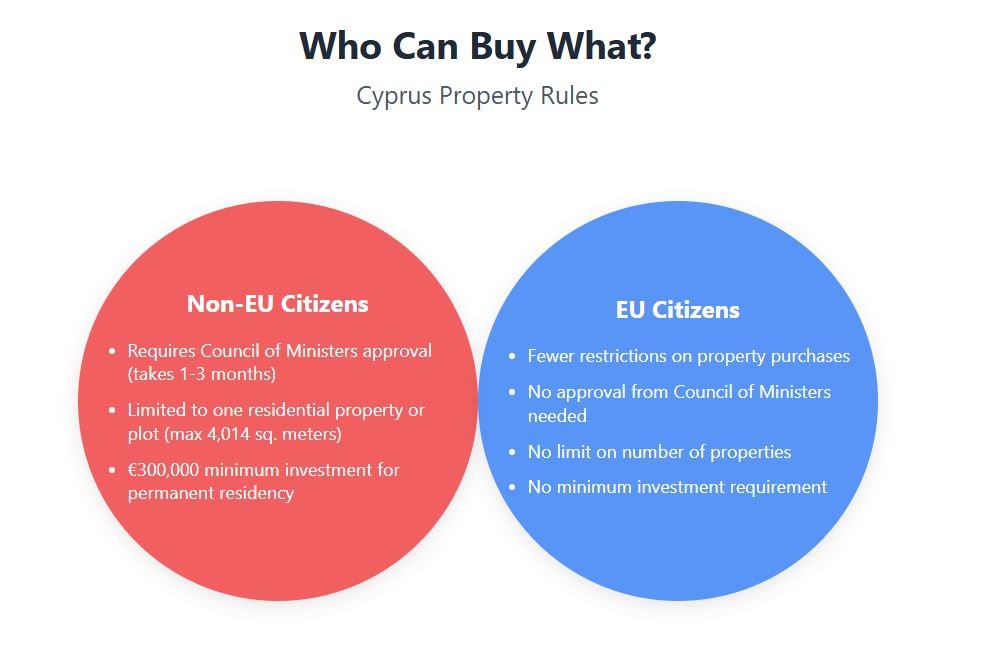
This approval process adds complexity and potential delays that EU citizens don’t face. Properties may remain under the developer’s name for years due to pending administrative approvals. Existing mortgages or debts can prevent title deed issuance entirely.
The €300,000 minimum investment for non-permanent residency sounds straightforward, but the legal requirements and restrictions are incredibly complex. Many expats discover too late that their dream property has legal problems or that they don’t actually own what they thought they bought.
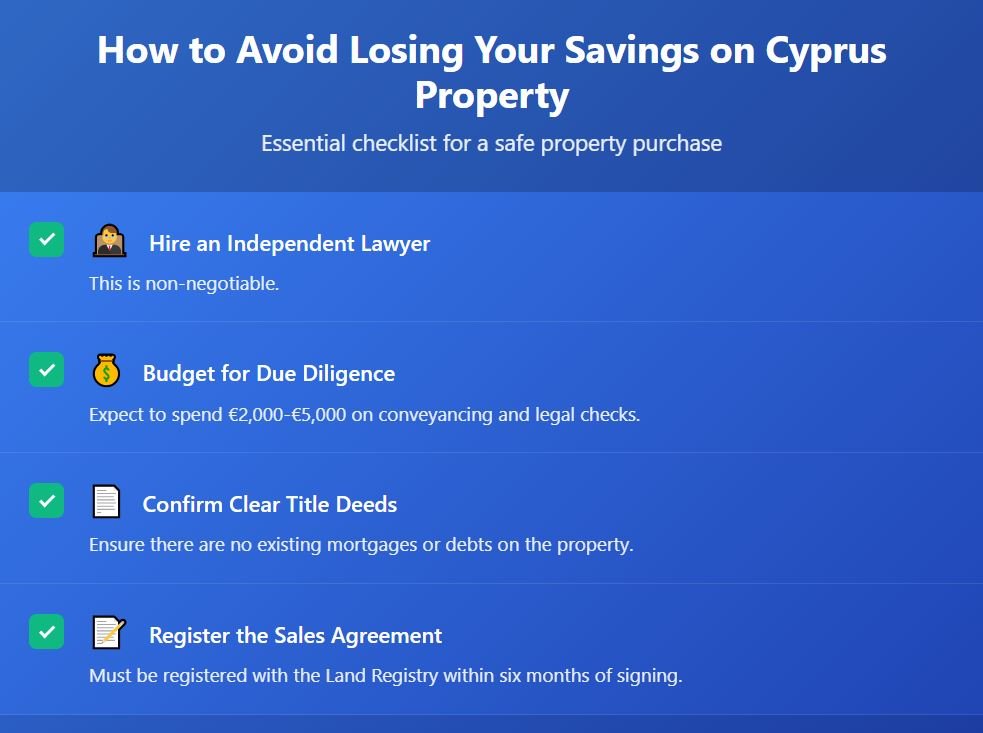
Past instances of property fraud have been reported involving alleged collusion between developers, banks, and lawyers. Some expats have lost their entire investment to legal issues or found themselves unable to sell when they wanted to leave.
The sales agreement must be registered with the land registry within six months of signing to safeguard your rights. And expect to spend 2,000 to €5,000 on due diligence and legal assistance, which safeguards against fraud and zoning issues.
These costs cover the lawyer’s services in verifying title deeds, checking for incumbrances, and ensuring compliance with all relevant regulations. Treat legal fees as insurance; experienced local counsel is non-negotiable if you want to secure your property and residency.
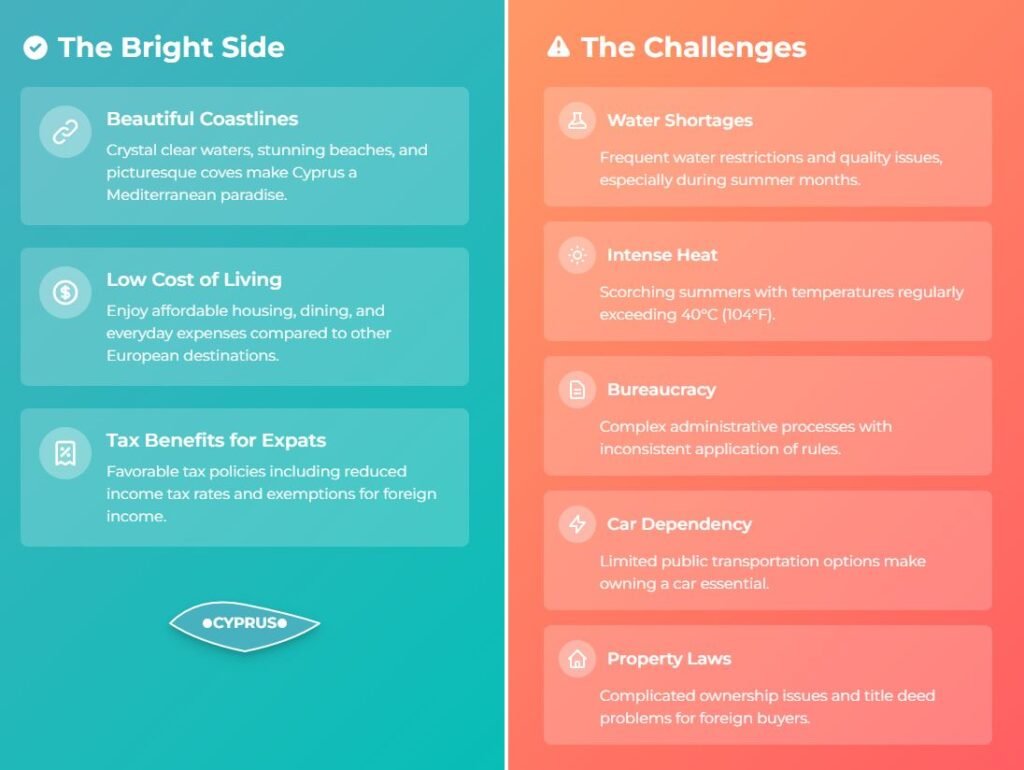
Despite all this, I repeat, Cyprus is one of the most spectacular places in the Mediterranean, together with some Italian, Greek, and Spanish localities, which I covered in my article about the best cities and towns to retire in Europe.
Levi Borba is the founder of expatriateconsultancy.com, creator of the channel The Expat, and best-selling author. You can find him on X here. Some of the links above might be affiliated links, meaning the author earns a small commission if you make a purchase.




